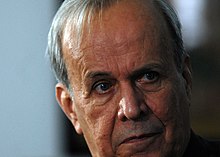Ricardo Alarcon
| Ricardo Alarcón de Quesada | |
|---|---|

Ricardo Alarcón in 2008
(Photo: Marcello Casal Jr./ABr) |
|
| President of the National Assembly of People's Power | |
|
In office 24 February 1993 – 24 February 2013 |
|
| Vice President | Jaime Alberto Hernandez-Baquero Crombet |
| Preceded by | Juan Escalona Reguera |
| Succeeded by | Esteban Lazo |
| Minister of Foreign Affairs | |
|
In office 1992–1993 |
|
| Premier | Fidel Castro |
| Preceded by | Isidoro Malmierca Peoli |
| Succeeded by | Roberto Robaina |
| Personal details | |
| Born |
Ricardo Alarcón de Quesada 21 May 1937 Havana, Cuba |
| Nationality | Cuban |
| Political party | Communist Party of Cuba |
| Profession | Civil servant |
Ricardo Alarcón de Quesada (born 21 May 1937) is a Cuban statesman. He served as Cuba's Permanent Representative to the United Nations (UN) for nearly 30 years and later served as Minister of Foreign Affairs from 1992 to 1993. Subsequently, Alarcón was President of the National Assembly of People's Power from 1993 to 2013, and because of this post, was considered the third-most powerful figure in Cuba. He also was a Member of the Central Committee of the Communist Party of Cuba until 2013.
A graduate of the University of Havana with a doctorate in philosophy, he served in various diplomatic posts following the Cuban Revolution. His first post in connection with Cuba's foreign policy was as Head of the Americas Division of Cuba's Foreign Ministry. During his tenure as Permanent Representative to the UN Alarcón held several leading offices, such as Vice President of the General Assembly of the United Nations.
Alarcón was born in Havana on 21 May 1937. He entered the University of Havana in 1954 and graduated with a degree as a Doctor of Philosophy and Humanities. Alarcón became active in the Federation of University Students (FEU), serving as the secretary of culture for the FEU from 1955 to 1956. Alarcón would become active in Castro's 26th of July Movement, which was attempting to oust Cuban President Fulgencio Batista, in July 1955. Alarcón assisted in the organization of the student apparatus of the guerrilla organization's youth brigade. Alarcón was elected the FEU's Vice President in 1959, and would serve as the President of the Student Organization from 1961 to 1962. However, unlike the Castros, Alarcón was active in the urban underground resistance, and not the guerilla movement located in the countryside.
In 1962, the new Castro-led government appointed Alarcón as the Director of the Ministry of Foreign Affairs' Americas division, where he would begin his diplomatic career. Between 1966 and 1978 he served as Permanent Representative of Cuba to the United Nations, Vice President of the General Assembly of the United Nations, President of the Council of Administration to the United Nations Development Programme, and Vice-President of the United Nations Committee on the Exercise of the Inalienable Rights of the Palestinian People. In 1978 Alarcón was promoted to first vice-minister of the Ministry of Foreign Affairs. While serving as Permanent Representative to the UN for a second time, Alarcón was President of the Security Council in February 1990 and July 1991. In 1992 was made Minister of Foreign Affairs, and in February 1993 he became the President of the National Assembly.
...
Wikipedia
